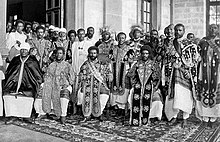

Until the end of the Ethiopian monarchy in 1974, there were two categories of nobility in Ethiopia and Eritrea. The Mesafint (Ge'ez: መሳፍንት masāfint, modern mesāfint, singular መስፍን masfin, modern mesfin, "prince"), the hereditary royal nobility, formed the upper echelon of the ruling class. The Mekwanint (Ge'ez: መኳንንት makʷanint, modern mekʷanint, singular መኰንን makʷanin, modern mekʷanin or Amharic: መኮንን mekonnen, "officer") were the appointed nobles, often of humble birth, who formed the bulk of the aristocracy. Until the 20th century, the most powerful people at court were generally members of the Mekwanint appointed by the monarch, while regionally, the Mesafint enjoyed greater influence and power. Emperor Haile Selassie greatly curtailed the power of the Mesafint to the benefit of the Mekwanint, who by then were essentially coterminous with the Ethiopian government.
The Mekwanint were officials who had been granted specific offices in the Abyssinian government or court. Higher ranks from the title of Ras descending through to Balambaras were also bestowed upon members of the Mekwanint. A member of the Mesafint, however, would traditionally be given precedence over a member of the Mekwanint of the same rank. For example, Ras Mengesha Yohannes, son of Emperor Yohannes IV and thus a member of the Mesafint, would have outranked Ras Alula Engida, who was of humble birth and therefore a member of the Mekwanint, even though their ranks were equal.
There were also parallel rules of precedence, primarily seniority based on age, on offices held, and on when they each obtained their titles, which made the rules for precedence rather complex. Combined with the ambiguous position of titled heirs of members of the Mekwanint, Emperor Haile Selassie, as part of his programme of modernising reforms, and in line with his aims of centralising power away from the Mesafint, replaced the traditional system of precedence with a simplified, Western-inspired system that gave precedence by rank, and then by seniority based when the title had been assumed – irrespective of how the title was acquired.[1]